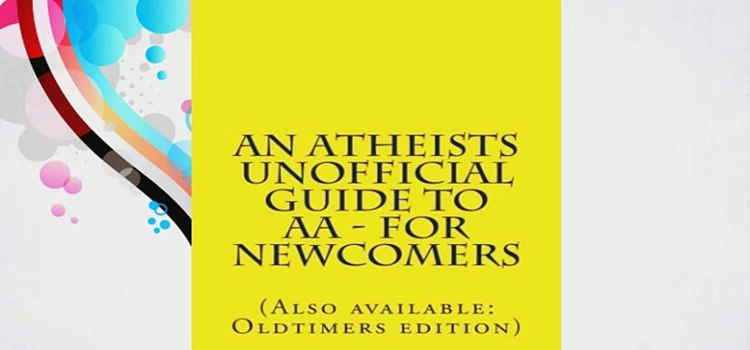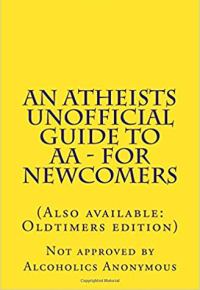An Atheists Unofficial Guide to AA

By Vince H.
I am an atheist alcoholic who believes that many people who could be saved from drink by AA do not embrace the fellowship because they are put off by a higher power understood as “God.”
I have written a book which tweaks the Steps and demonstrates that it is not necessary to believe in a god to follow the program. The idea is to widen the AA net to catch people who would otherwise not be saved.
My book is called An Athiest’s Unofficial Guide to AA. You can learn more about it and order it online here at Amazon Books.
Not being put off by the god stuff in the Steps enables people to adopt the program earlier than they would have done otherwise. It gives me a lift to see young people getting the program. I think they’ve saved themselves and others around them from a great deal of potential harm. Subtract all that harm and the world is on its way to becoming a better place for all of us.
Defining one’s own greater power is central to the original AA program. Even if it is on the basis of: “I don’t know what it is, but I know it is.” I find this as basic as I find “fake it to make it” dishonest. For me, when it is boiled down, atheists and agnostics only need to use a greater power for help in letting go of self-will in Step 3 by comparing themselves with something bigger. The bigger, the better. One of my greater powers is the group therapy of AA. Another is nature and evolution. Others I have heard of are trees and buses. We then see how small we are in the scale of things. This is a major difference from gods as imaginary friends.
It is important for atheists and agnostics in AA to stay under the umbrella of the Alcoholics Anonymous organization, together with Christians and those professing other faiths, for many reasons.
I shall list some here under a) Atheists need AA, b) AA needs atheists, and c) We need each other.
Atheists need AA
There is the spiritual importance of belonging to a group – and the bigger the group the better, especially if it is your greater power. As atheists, virtually the only thing that is important about greater powers is that they are big, and AA is bigger with us in it.
If atheists set up their own organization outside AA presumably they would have all the growing pains that would be avoided by staying inside a mature organization. (AA could probably do without the diversion of resources and unwanted publicity that a split would inevitably generate, even if the publicity was unwanted by both parties.)
AA is as efficient an organization run by amateurs as you are going to get.
AA needs atheists
The more of us helping each other, the more power there is to each individual to accomplish their program.
 The bigger AA is the more authoritative it appears as a solution for alcoholism. This should attract more alcoholics to us, for in truth we attract very few and are successful with even fewer, even if we are the cheapest and best recovery resource on the market. Widening the net is very important. Also institutions, which send their customers to us after they have dried them out, may think of us more often, the bigger and more all-embracing we appear.
The bigger AA is the more authoritative it appears as a solution for alcoholism. This should attract more alcoholics to us, for in truth we attract very few and are successful with even fewer, even if we are the cheapest and best recovery resource on the market. Widening the net is very important. Also institutions, which send their customers to us after they have dried them out, may think of us more often, the bigger and more all-embracing we appear.
Doubts about AA’s claims not to be religious are held not only inside AA, but they are held externally, too, by various US courts. Truly embracing atheists is the best way I can think of to dispel these notions.
We need each other
We understand each other as alcoholics. It doesn’t matter what kind of alcoholics we are – atheists, agnostics, god-fearing – we all need each other to have an understanding audience for our shares and to help each other with the common problem of alcoholism.
However there are some differences on the spiritual side between religious believers and non-believers that are best out in the open so that we don’t misunderstand each other. Religious believers are fully served by the Big Book whereas non-believers aren’t. That is where other books come in that help those who aren’t religious, and those who aren’t sure, in the AA program – and for those who are god-based to read to understand us better if they so desire.
Further, the religiousness of AA is specifically Christian. More and more potential members, especially in non-Christian areas of the world, don’t feel strong identification with the Christian aspect of the original program. Many people who are not happy with the old text may find that a completely non-religious book makes it possible for them to do the program anyway. An Atheist’s Unofficial Guide to AA is meant to be a complementary portal into AA.
To anyone who says the steps are sacrosanct, I say Bill W set up the structure of AA to enable change. He understood that times and circumstances change and he designed the World Conference and the administrative functions of AA to respond to change in the world around us. For me, that includes accommodating non-Christians of all kinds from Moslems to atheists, and the way to make AA truly non-religious is to take god out of the steps.
I have actually changed during my time in AA into an atheist from an agnostic. Partly the change to atheism stems from my reading of The God Delusion by Richard Dawkins in which he points out that organized religions can be positively harmful. Think of all the wars around the world based on religion from the crusades onwards right through to Islamists destroying the twin towers in New York.
But my change is due as well to Herbert Spencer and what he is quoted as saying in Appendix Two of the Big Book: “There is a principle which is a bar against all information, which is proof against all arguments and which cannot fail to keep a person in everlasting ignorance – that principle is contempt prior to investigation.”
Indeed, one of the reasons for the immeasurable gratitude that I feel towards AA is that it has led me on to the path that I am on today.
Vince H is an AA member and a life member of the British Humanist Association. He lives in Valencia, Spain, when not attending AA meetings on his global travels. He usually winters in Indonesia and Thailand, but has been known to travel as far afield as Australia, the US and Russia. He used to sit in a pub dreaming he was free to travel anywhere but was in reality chained to a barstool. Now fulfilling dreams – such as traveling the world – is one of Vince’s definitions of spirituality.

























Vince showed me the printer’s proofs of “An Atheist’s Unofficial Guide to AA” over lunch in Chiang Mai, Thailand, and I thought it was a very nice, thoughtful guide for nonbelievers. I think there is a lot of room for more literature to support nonbelievers in recovery. Vince, I like your phrase “greater power” rather than “higher power,” where yours feels more neutral. For me, I often find the sharing and readings in many meetings have so much god-talk that I don’t feel safe enough or relaxed enough to open up about my own perspective, more because I don’t want to offend than being unsure about my position.
There’s always going to be resistance to any kind of change with an organization as large as AA but any group needs to change with the times no matter how difficult. Vince’s book is worth looking at.
Macha M
Cambridge, Massachusetts, USA